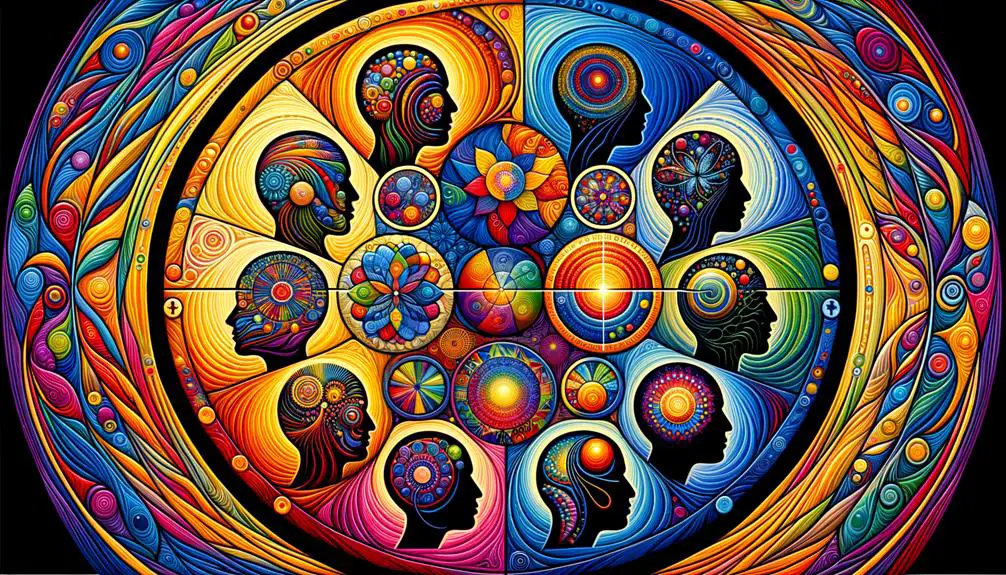Are you aware that the first few years of your life can significantly shape your future development? In fact, according to Erikson's Model, the experiences and challenges you face during infancy and early childhood can have a lasting impact on your psychosocial growth.
But what exactly is Erikson's Model, and how does it help us understand the secrets of human growth? This discussion will delve into the fascinating world of Erikson's Model, exploring its eight stages, key concepts, and criticisms, all while uncovering its significance and practical applications.
Prepare to gain insights that will challenge your understanding of personal development and provide you with the tools to navigate life's challenges more effectively.
Key Takeaways
- Erikson's model of psychosocial development consists of eight stages, each influenced by biological, psychological, and social factors.
- Personality transformation continues beyond adolescence, highlighting the importance of ongoing growth and development throughout the lifespan.
- Failure to successfully complete a stage can have an impact on future development, emphasizing the significance of resolving conflicts and building virtues.
- While there are criticisms of Erikson's theory, such as the order and accuracy of the stages, his model provides a valuable lens for understanding human growth and offers insights for self-discovery and dialogue.
The Eight Stages of Erikson's Model
The eight stages of Erikson's Model provide a comprehensive framework for understanding the psychosocial development of individuals throughout their lifespan. These stages are characterized by specific developmental milestones that individuals must navigate to achieve healthy growth and development.
Erikson believed that each stage is influenced by a combination of nature and nurture, with biological, psychological, and social factors shaping an individual's experiences and outcomes. The nature vs. nurture debate is an important aspect of Erikson's Model, as it highlights the interplay between genetics and environmental influences in shaping human development.
Understanding and addressing the challenges and conflicts that arise at each stage is crucial for individuals to successfully navigate through them and develop a strong sense of self and identity.
Key Concepts in Erikson's Model

Key concepts in Erikson's Model include the influence of biological, psychological, and social factors on each stage of psychosocial development. Understanding these key concepts is essential for comprehending the complexities of human growth and development.
Here are four important points to consider:
- Each stage of psychosocial development is shaped by a combination of biological, psychological, and social factors. These factors interact and influence an individual's progress through each stage.
- Resolving conflicts is a central aspect of Erikson's Model. Each stage presents a unique challenge or conflict that individuals must overcome to achieve healthy development. Successfully resolving these conflicts contributes to the formation of a strong and integrated sense of self.
- Failure to complete a stage can have long-lasting effects on future development. Unresolved conflicts can lead to difficulties in forming healthy relationships, establishing a sense of identity, and experiencing overall well-being.
- Building virtues and developing a sense of purpose are crucial for healthy development. By overcoming conflicts and acquiring virtues such as trust, autonomy, and integrity, individuals are better equipped to navigate subsequent stages of life successfully.
Criticisms of Erikson's Theory

One common criticism of Erikson's theory is that the stages may not occur in the exact order described. Some researchers argue that individuals may experience these stages in different sequences or even revisit certain stages later in life. Additionally, the age ranges assigned to each stage have been questioned for their accuracy, as development can vary among individuals.
Another criticism is that Erikson's suggestion of passivity in stage eight, where individuals reflect on their lives, may not apply to everyone in later years. Moreover, the idea of searching for identity isn't limited to adolescence, as individuals may continue to explore and define their identities throughout their lives.
Furthermore, critics argue that the detailed mechanisms and steps involved in each stage are unclear, making it difficult to fully understand and apply the theory. When applying Erikson's model in education and evaluating its cultural relevance, it's important to consider these criticisms and approach the theory with a critical lens.
The Importance of Erikson's Model

Understanding the significance of Erikson's Model is crucial in comprehending the complexities of human growth and development. Here are four reasons why Erikson's Model is important:
- Lifelong learning: Erikson's Model recognizes that growth and development continue throughout the lifespan, emphasizing the importance of ongoing learning and personal growth.
- Teaching strategies: Erikson's Model can be used in educational settings to inform teaching strategies. By understanding the psychosocial challenges individuals face at different stages of development, educators can tailor their instructional methods to better support students' needs.
- Resolving conflicts: Erikson's Model helps us understand how conflicts can be overcome in development. By recognizing and addressing these conflicts, individuals can navigate through life's challenges and achieve healthy development.
- Carrying forward learnings: Erikson's Model emphasizes the importance of carrying forward learnings from one stage to another. This recognition allows individuals to build upon previous experiences and develop a strong sense of identity and purpose throughout their lives.
Impact and Applications of Erikson's Model

The impact and applications of Erikson's Model can be seen in various fields, including psychology, education, counseling, and research.
Using Erikson's model in counseling allows therapists to understand and address psychosocial challenges by exploring the individual's stage of development and the conflicts they may be facing.
In education, Erikson's model is applied to inform teaching strategies, recognizing the importance of considering students' psychosocial development alongside their academic learning.
The model provides a framework for understanding identity and life transitions, helping individuals navigate these changes and find a sense of purpose and fulfillment.
Additionally, Erikson's model continues to be studied and applied in research and practice, contributing to our understanding of human growth and development.
Using Erikson's Model in Practice

Applying Erikson's Model in practice enhances understanding of individuals' psychosocial development and guides interventions to address their unique challenges. Here are four ways you can utilize Erikson's Model in practice:
- Applying Erikson's model in therapy: Therapists can use the model to assess where clients may be experiencing challenges in their psychosocial development. This allows them to tailor interventions that address specific issues and promote growth.
- Integrating Erikson's model in educational curriculum: Educators can incorporate Erikson's stages into their teaching strategies. This helps students understand their own development, fostering self-awareness and empathy. It also allows educators to create learning experiences that align with students' developmental needs.
- Facilitating identity exploration: Erikson's model can be used to guide individuals in exploring their sense of identity. Therapists and educators can provide opportunities for self-reflection, encouraging individuals to explore their values, beliefs, and goals.
- Promoting healthy aging: Erikson's model can be applied to support older adults in finding meaning and fulfillment in their later years. By recognizing the importance of integrity and generativity, therapists and caregivers can assist older adults in maintaining a sense of purpose and overall well-being.
Frequently Asked Questions
Erikson's model of psychosocial development offers a unique perspective on human growth and development. When compared to other theories, it highlights the importance of social factors and ongoing personal transformation. However, it also faces critiques and controversies regarding the order of stages and age ranges.
Are There Any Cultural or Individual Differences That May Impact the Progression Through Erikson's Stages?
Cultural variations and individual differences can impact the progression through Erikson's stages. Factors such as cultural norms, values, and beliefs, as well as personal experiences and identities, can influence how individuals navigate and resolve the psychosocial challenges at each stage.
Can Erikson's Model Be Applied to Understand and Support Individuals With Developmental Disabilities or Special Needs?
Erikson's model can be applied to understand and support individuals with developmental disabilities or special needs by recognizing the unique challenges they face at each stage. It provides insights for tailored interventions and fostering healthy development.
External factors, such as family dynamics and socioeconomic status, significantly influence psychosocial development. Cultural and individual differences shape how these factors impact each person. Understanding these influences can help support healthy growth and development.
What Are Some Potential Limitations or Challenges in Applying Erikson's Model in Real-Life Situations or Practical Settings?
In applying Erikson's model, you may face limitations and challenges. Some include the potential for stages to not occur in order, inaccurate age ranges, and the suggestion of passivity in later years. Additionally, the detailed mechanisms of each stage are unclear.
Conclusion
Congratulations! You have just unlocked the secrets of human growth with Erikson's Model.
By exploring the eight stages, key concepts, and criticisms, you have gained a comprehensive understanding of its significance and applications.
Now, armed with this knowledge, you can navigate through life's challenges with confidence and pave the way for a fulfilling future.
So go forth and embrace the wisdom of Erikson's Model, and let it guide you on your journey to self-discovery and personal development.
The keys to success are in your hands!

